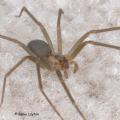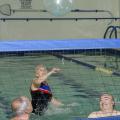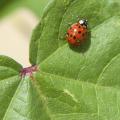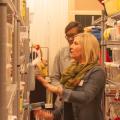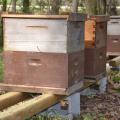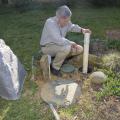Feature Story from 2016
STARKVILLE, Miss. -- Spring-cleaning is bad news for dust, mildew and spiders, which may explain why the majority of American adults plan to get out the mops and buckets this season.
A good house cleaning involves washing windows and window dressing, moving furniture to reach dust and grime that accumulates, and airing out rooms and closets that are kept closed. It is an important step in preventing houses from becoming home to spiders, such as the venomous brown recluse.
STARKVILLE, Miss. -- A Mississippi State University social scientist is leading a project to promote healthy lifestyles in a state not usually known for its wholesome habits.
Ginger Cross, an assistant research professor in the MSU Social Science Research Center, is promoting the “WannaBee Healthy?” campaign, sponsored by a Science Education Partnership Award from the National Institutes of Health.
STARKVILLE, Miss. -- Most Mississippians know obesity can lead to diabetes, but they may not realize it can also increase risks of stroke, asthma, arthritis and some cancers.
Ginger Cross, an assistant research professor in the Mississippi State University Social Science Research Center, is leading a project designed to promote healthy lifestyles in northeast Mississippi. Key components of the project are awareness and education.
STARKVILLE, Miss. -- With proper planning, it does not have to cost extra time and money to provide each family member with half a plate of fruits and vegetables at mealtime.
The U.S. Department of Agriculture’s MyPlate recommendation is for half our plates be filled with fruits and vegetables at every meal. The remaining 50 percent of the plate should include protein and grains (often meat and bread). USDA also promotes a serving of dairy.
STARKVILLE, Miss. -- Asian lady beetles are known for inviting themselves into houses and other structures during winter to hibernate, but they can be just as much of a nuisance in the spring when they are trying to go back outside.
Soffit and gable vents in home attics are common entry points for the beetles, but they will come in any way they can. Any crack in windows, walls or the sides of doors is a welcome mat.
BILOXI, Miss. -- Agricultural producers met with Mississippi State University experts on Feb. 23 at the Coastal Research and Extension Center Commodity Advisory Council meeting.
The meeting is an annual event that brings coastal area producers, industry professionals and MSU personnel together to discuss research and educational priorities for the coming year. Producers converged on the center despite severe weather threats to provide essential input.
CANTON, Miss. -- Canton area residents now have access to an expanded resource and referral center for child care and early education.
Early care and education providers, parents and other residents will be able to use lending library materials, such as books, toys and puzzles, die-cut machines and other instructional resources, while also having access to early child care professionals at the downtown center.
RAYMOND, Miss. -- Beekeeping is hot right now, with numbers of producers steadily increasing in Mississippi and across the U.S.
“Beekeeping continues to grow in astonishing numbers across the country,” said Jeff Harris, bee specialist with the Mississippi State University Extension Service. “Most of that growth is from people who want to do it as a hobby.”
Johnny Thompson, a Philadelphia, Mississippi, beekeeper who raises queens and nucleus colonies, said about half of his customers are new to beekeeping.
PICAYUNE, Miss. -- South Mississippi students will learn details about daily wood use when they visit the Mississippi State University Wood Magic Science Fair on March 31.
MSU Wood Magic will be an attraction at the Crosby Arboretum’s Wildlife Day, a one-day event that draws 200 to 300 participants annually.
Students from kindergarten to the eighth grade will learn all about the significance of wood in their lives. Teachers will receive resource materials and contact information for useful teaching aids.
STARKVILLE, Miss. -- Wild game processors can learn the best food safety practices at a free workshop offered in three different locations.
“Sanitation, Safety and Risk Reduction Practices for Wild Game Processors” will be held from 6:30 to 8 p.m.:
STARKVILLE, Miss. -- While a good bargain is always thrilling, safety is the most important thing to consider when shopping online.
Jamie Varner, an instructor for the Mississippi State University Extension Center for Technology Outreach, said it is better to be safe than sorry when shopping on websites.
“Safety is a concern whether we are driving our car or making purchases online,” she said. “Keeping your information secure online requires you to take more time and care, but what you lose in moments, you will make up for with peace of mind.”
STARKVILLE, Miss. -- Many people are conditioned to think that any fire in the forest is a bad thing, but controlled burns prevent wildfires from being a problem in the woods.
Humans are the primary cause of forest fires in Mississippi. In 2015, there were about 1,800 wildfires in the state; lightning caused only eight of them. These fires affected an average area of 13 acres, for a total of about 23,000 acres burned. February and March face the highest risk of forest fire in Mississippi.
STARKVILLE, Miss. -- Good health begins at home, and Mississippians can learn more about hidden dangers lurking in their household environments through workshops available from the Mississippi State University Extension Service.
David Buys, Extension health specialist, said agents across the state are ready to deliver workshops on 12 different topics as part of the Healthy Homes Initiative.
STARKVILLE, Miss. -- Even in a state that averages more than 50 inches of rainfall a year, water conservation is important, and some water recycling has true value to homeowners.
The term “gray water” applies to water that has come in contact with humans, such as from sinks, washing machines, dishwashers, showers and bathtubs. It can be filtered and reused for irrigation and other purposes. Blackwater goes down the toilet and is typically treated commercially.
STARKVILLE, Miss. -- Families can celebrate the joy of early learning experiences during the annual celebration of the Week of the Young Child from April 11 to 15.
The Early Years Network, a program of the Mississippi State University Extension Service, will host daily activities at each of its 17 resource and referral sites across the state. From making musical instruments to crafts and dramatic play, Early Years Network staff members have planned hands-on fun for children, families and child care providers.
by Sarah Buckleitner
MSU Forest and Wildlife Research Center
STARKVILLE, Miss. -- Each spring the woods are littered with antlers as deer shed their old racks to make way for new sets, and these “sheds” may reveal hidden health problems in the bucks that drop them.
To learn more about these lucky finds, many people bring shed antlers to the Mississippi State University Deer Lab, which specializes in deer biology and antler formation.
STARKVILLE, Miss. -- Added sugar found in soda is not as sweet as it sounds.
David Buys, health specialist with the Mississippi State University Extension Service and researcher with the Mississippi Agricultural and Forestry Experiment Station, said a 12-ounce can of soda may contain as much as 10 to 12 teaspoons of sugar.
RAYMOND, Miss. -- Brandy Barnes’ excitement is building, but she keeps a cool head at the firing range.
In the summer of 2015, the 17-year-old Hinds County 4-H member scored among the top five .22-caliber rifle participants at the state shooting sports competition. The accomplishment earned her a spot at the National 4-H Shooting Sports Championship set for June 26 to July1, 2016, in Grand Island, Nebraska.
“It’s really starting to hit me now,” said Barnes. “I’m very excited.”
STARKVILLE, Miss. -- New research techniques learned at Mississippi State University through a scholar exchange program will help a cattle veterinarian from Egypt as she pursues a doctoral education in food safety.
STARKVILLE, Miss. -- From the drought in California to lead contamination in Flint, Michigan, water is on the minds of many Americans, Mississippians included.
In workplaces and homes across the Magnolia State, one question floats to the top: How do we know if our water is safe?
Jason Barrett, an assistant Extension professor in the Mississippi State University Extension Center for Government and Community Development, said water system operators and the Environmental Protection Agency have regulations and guidelines in place for testing and reporting test results.
Pages
Feature Story Archive
- 2024 (120)
- 2023 (114)
- 2022 (116)
- 2021 (105)
- 2020 (141)
- 2019 (127)
- 2018 (141)
- 2017 (199)
- 2016 (242)
- 2015 (320)
- 2014 (358)
- 2013 (374)
- 2012 (344)
- 2011 (248)
- 2010 (239)
- 2009 (229)
- 2008 (189)
- 2007 (210)
- 2006 (199)
- 2005 (224)
- 2004 (218)
- 2003 (228)
- 2002 (177)
- 2001 (184)
- 2000 (190)
- 1999 (182)
- 1998 (179)
- 1997 (188)
- 1996 (58)
- 1995 (36)

